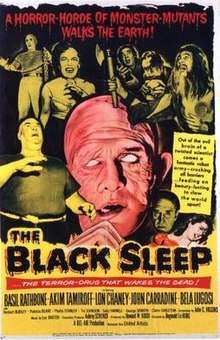The Black Sleep
The Black Sleep is a 1956 American independent horror film directed by Reginald LeBorg, and written by John C. Higgins from a story by Gerald Drayson Adams. It stars Basil Rathbone, Lon Chaney Jr., John Carradine, Bela Lugosi, and Akim Tamiroff. Tor Johnson appears in a supporting role. The film was produced by Aubrey Schenck and Howard W. Koch, as part of a four-picture finance-for-distribution arrangement with United Artists.
| The Black Sleep | |
|---|---|
 Theatrical release poster | |
| Directed by | Reginald Le Borg |
| Produced by | Howard W. Koch executive Aubrey Schenck |
| Written by | John C. Higgins |
| Based on | story by Gerald Drayson Adams |
| Starring | Basil Rathbone Akim Tamiroff Lon Chaney, Jr. John Carradine Bela Lugosi Herbert Rudley Tor Johnson |
| Narrated by | Basil Rathbone |
| Music by | Les Baxter |
| Cinematography | Gordon Avil |
| Edited by | John Schreyer |
Production company | Bel-Air Productions (Prospect Productions) |
| Distributed by | United Artists |
Release date |
|
Running time | 82 minutes |
| Country | United States |
| Language | English |
| Budget | $225,000[1] |
The film was released as a double feature with the 1955 British film The Creeping Unknown. The Black Sleep was re-released in 1962 under the title Dr. Cadman's Secret.
Plot
Set in England in 1872, the story concerned a prominent, knighted surgeon whose wife has fallen into a coma caused by a deep-seated brain tumor. Due to medicine's state of the art at the time, he does not know how to reach the tumor without risking brain damage or death to the woman he loves, so he undertakes to secretly experiment on the brains of living, but involuntary, human subjects who are under the influence of a powerful Indian anesthetic, Nind Andhera, which he calls the "Black Sleep". Once he has finished his experiment, surviving subjects are revived and placed, in seriously degenerated and mutilated states, in a hidden cellar in the gloomy, abandoned country abbey where he conducts his experiments.[2][3]
Cast
- Basil Rathbone as Sir Joel Cadman
- Akim Tamiroff as Udu the Gypsy
- Herbert Rudley as Dr. Gordon Ramsay
- Patricia Blake as Laurie Munroe
- Phyllis Stanley as Daphnae
- Lon Chaney Jr. as Dr. Munroe aka Mungo
- John Carradine as "Bohemund"
- Bela Lugosi as Casimir
- Tor Johnson as Mr. Curry
- George Sawaya as Sailor Subject
- Sally Yarnell as Female Subject
- Peter Gordon as Det. Sgt. Steele
- Claire Carleton as Carmoda Daily
- John Sheffield as Det. Redford
- Clive Morgan as Roundsman Blevins
- Louanna Gardner as Angelina Cadman
- Aubrey Schenck as Prison Coroner's Aide (uncredited)
Release
Produced during 1955, the film was released to theaters in the early summer of 1956. This was just ahead of the TV syndication, through Screen Gems, of two decades of Universal monster movies, under the package title Shock Theater. Writer Higgins, director LeBorg, and stars Rathbone, Chaney, Carradine, and Lugosi had all been significantly associated with Universal horror films or related B movies. The Black Sleep is similar to Universal's two "houseful" of monster films released in the mid-40s, House of Frankenstein and House of Dracula, only relying on a completely new cadre of human monsters.
Critical reception
Amongst contemporary reviews, Variety wrote that the film "plays the horror tale fairly straight so what's happening is not too illogical until the finale wrapup, when all restraint comes off and the melodramatics run amok. ...Basil Rathbone is quite credible as the surgeon, enough so that the brain operations he performs will horrify many viewers"; and The Motion Picture Exhibitor noted that "Rathbone has a grand time as the mad scientist, assisted nobly by some of the best names in the horror field. Audiences should be frightened plenty, and past experience proves that this can mean good grosses... Sure, a lot of it is corny, but it is all good fun in a grisly, frightening manner."[4]
Home media
The Black Sleep was released by Kino on Blu ray in 2016 and contains audio commentary by Tom Weaver and David Schecter.
See also
References
- Tom Weaver, Interviews with B Science Fiction and Horror Movie Makers: Writers, Producers, Directors, Actors, Moguls and Makeup McFarland, 1 Jan 2006 p 211
- Warren, Bill (2017-01-12). Keep Watching the Skies!: American Science Fiction Movies of the Fifties, The 21st Century Edition. McFarland. ISBN 9781476625058.
- Rhodes, Gary Don (2012-06-01). Lugosi: His Life in Films, on Stage, and in the Hearts of Horror Lovers. McFarland. ISBN 9781476600772.
- "The Black Sleep (1956) - Articles - TCM.com". Turner Classic Movies.
External links
| Wikiquote has quotations related to: The Black Sleep |
- The Black Sleep on IMDb
- The Black Sleep at AllMovie
- The Black Sleep at Basilrathbone.net
- The Black Sleep at the TCM Movie Database